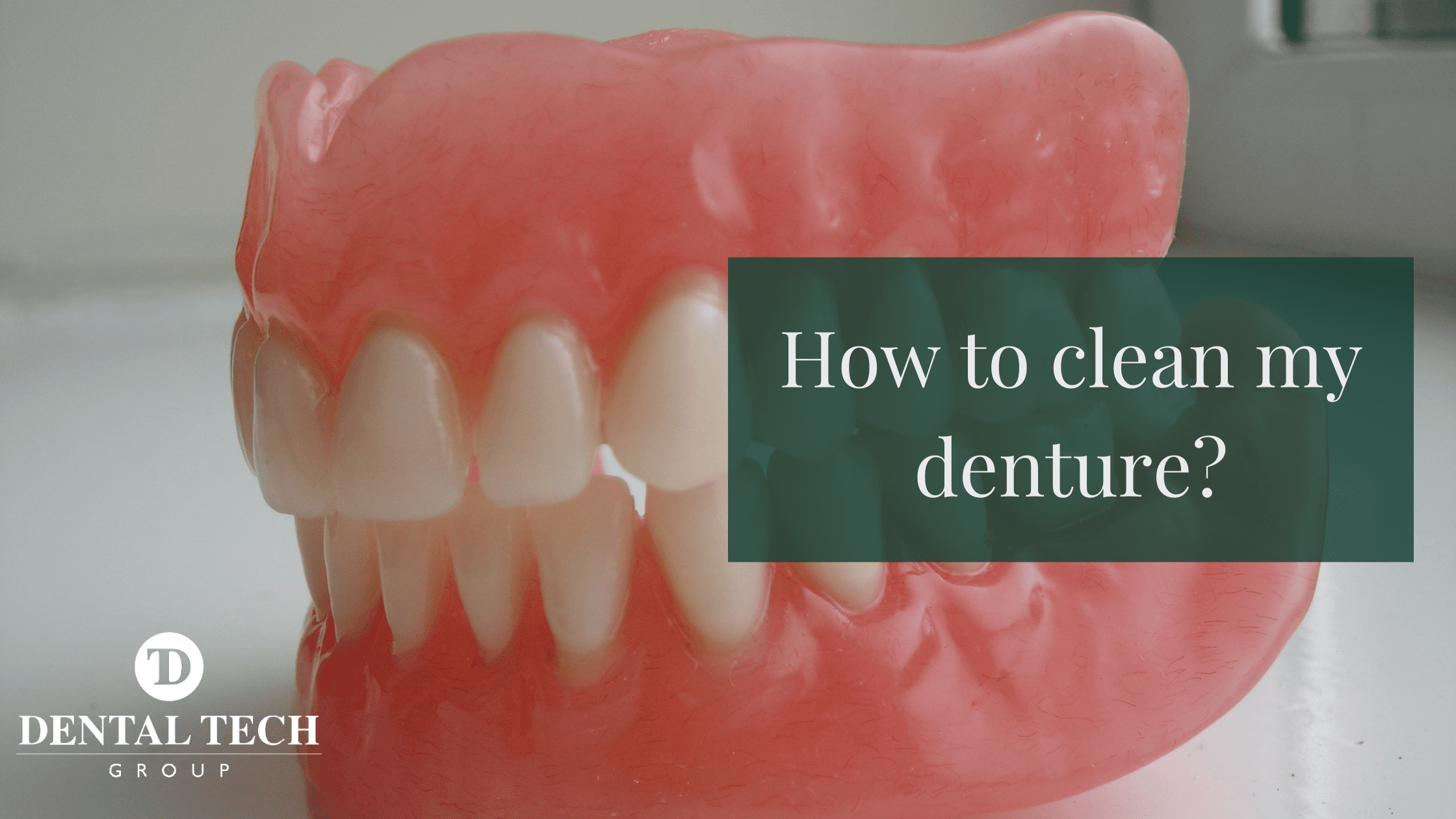Always wonder how to clean your dentures? Wonder no more.
Here at Dental Tech Group, we created basic steps for you to understand and clean your dentures appropriately. Easy steps from Irelands First 3D denture clinic in Dublin, Waterford, and Wexford.
The following are the steps created by the Clinicians in our denture Clinics.
First, make sure you have the following to clean your dentures: Flat Based Top, a Container, Hand Warm Water, Washing Liquid, Brush, Gloves, tissue.
To ease the process of cleaning your denture make sure your flat based container has tissue under it so it won’t slide, also it makes for easier cleaning afterwards and reduces the risk of dropping your denture onto a hard surface and breaking it or cracking.
Fill the container with hand warm water, put a drop of the washing liquid in the water and stir. Then holding your denture gently dip it in the water, remember DO NOT squeeze as it could break.
Now you are ready to start cleaning your denture. Remember your brush can be small to medium size, depending upon size of your denture. Brush to remove any food between teeth, brush all around the denture, the washing liquid then ensures there is no food debris left. Rinse well with clean water and dry using a clean tissue.
Now you are ready to clean your dentures. This part is very important. Not sure how to disinfect your dentures? Watch our video below on how to disinfect your denture after cleansing.
Dentures can improve your oral health and lifestyle. Dentures are artificial teeth and gums that provides you with comfort to chew, eat, and speak. An essential step to keep a healthy smile is to replace teeth which are missing. They are created to replace lost teeth or removed teeth. Dentures can be partial or full, bottom, or top, and it will depend on your needs. They are made to a precise fit and match perfectly your mouth and existing teeth. Dentures also prevent age lines forming by providing support for the lips and cheeks.
The recommended life of a denture is 5 years. During that time the denture will wear out, the teeth will become smooth and flat. It is important to know that a person’s mouth can change over the years, people lose teeth and weight and all of these affect the denture. That is why we recommend that you change your denture every five years. At times we might see dentures 20 years and more but we also can see the discomfort they cause and how unhygienic they are.
The process of making dentures is simple. We simply take an impression of your mouth, this is unique to you, no two people are the same. Your impression will be taken digitally or traditionally, so your denture has your own unique measurements.
Denture teeth are typically made of Lucitone resin. This material has the same translucent look as natural teeth and can be personalized to the other existing teeth colour. Not only the colours are similar, but the feel is close to natural teeth too.
Acrylic dentures area type of plastic created specifically for the mouth and acrylic teeth inserted into it. Cobalt dentures are metal alloy denture frame with acrylic teeth attached. Cobalt dentures are durable, thin and very strong. 3D dentures are made of Lucitone resin, it is a high-impact resin exceeds ISO standards for impact resistance, providing exceptional durability and strength. 3D Printed dentures are the exact replica or your mouth and this is captured in one scan done in our clinic.
Dentures models differ from person to person and types of dentures are individual to the persons requirements, whether is a partial or complete denture that is necessary. Our Clinical Dental Technician will design and produce your dentures to fit perfectly to your mouth shape.
Usually, dentures take 1-4 weeks from start to finish. It depends on what is your specific needs. The timeframe can be determined in the consultation. 3D printed dentures takes less time than the typical dentures made of cobalt and acrylic.
It takes up to 6 weeks for new dentures to adjust to your mouth and muscles to adjust to the better new fitting denture. Dental tech group also offer 3-month maintenance service on all new dentures which includes visits for adjustment or easing your new dentures.
Here are some tips to remember.
- Wash your dentures in warm soapy water at least once a day in a large flat based tub after every meal so you can remove food particles and debris.
- Don’t use boiling water as this will significantly damage your denture.
- Don’t wash your dentures in the sink – dropping and banging the sink are the most common reason of denture breakage.
- Disinfect your denture at least twice a week for one hour using Nitradine denture disinfectant tablets. Avoid leaving your dentures disinfecting overnight as it could damage your denture due to its tablet’s ingredients.
- Leave your denture out overnight or at least one hour per day. This allows the oral tissue in your mouth to rest and the blood to flow freely through it.
- Do not try to glue your denture together if it breaks, this makes it more difficult to repair.
- Always have a spare denture, it’s good to have a spare one for emergencies.
Wondering on what our patients say about us? Read down below, if still not convinced call us for a free denture consultation.
“From start to finish my experience was extremely good ad my end result is amazing. I am happier that I have been in years and can recommend dental tech group highly enough.”
Worried about whether you can afford routine dental care? Check out FlexiFi for flexible payment plans with us, starting from just €80 spend.
Here in Dental Tech, we have the most recent dental technology and over 50 years of experience, providing dentures that look natural and fit great.
Dental Tech Group, helping you EAT, CHEW AND SOCIALISE WITH CONFIDENCE.
For your FREE denture consultation Go to:
or Call now on:
- Dublin: 01 455 1866
- Wexford: 053 919 2 999
- Waterford: 051 365 999
For our portable Nursing Home and home care service go to:
And to book your online consultation go to:





Recent Comments